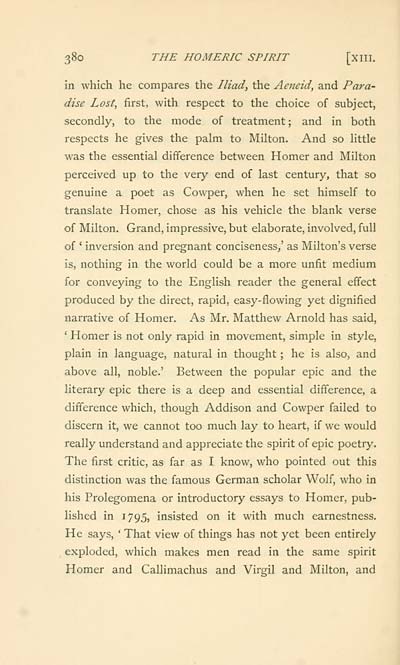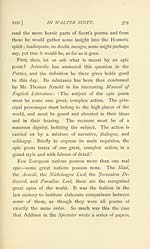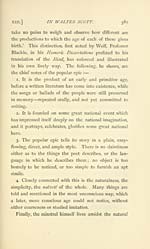Ossian Collection > Aspects of poetry
(396)
Download files
Complete book:
Individual page:
Thumbnail gallery: Grid view | List view

380 THE HOMERIC SPIRIT [XIII.
in which he compares the Iliad, the Aeneid, and Para-
dise Lost, first, with respect to the choice of subject,
secondly, to the mode of treatment ; and in both
respects he gives the palm to Milton. And so little
was the essential difference between Homer and Milton
perceived up to the very end of last century, that so
genuine a poet as Cowper, when he set himself to
translate Homer, chose as his vehicle the blank verse
of Milton. Grand, impressive, but elaborate, involved, full
of ' inversion and pregnant conciseness/ as Milton's verse
is, nothing in the world could be a more unfit medium
for conveying to the English reader the general effect
produced by the direct, rapid, easy-flowing yet dignified
narrative of Homer. As Mr. Matthew Arnold has said,
' Homer is not only rapid in movement, simple in style,
plain in language, natural in thought ; he is also, and
above all, noble.' Between the popular epic and the
literary epic there is a deep and essential difference, a
difference which, though Addison and Cowper failed to
discern it, we cannot too much lay to heart, if we would
really understand and appreciate the spirit of epic poetry.
The first critic, as far as I know, who pointed out this
distinction was the famous German scholar Wolf, who in
his Prolegomena or introductory essays to Homer, pub-
lished in 1795, insisted on it with much earnestness.
He says, * That view of things has not yet been entirely
exploded, which makes men read in the same spirit
Homer and Callimachus and Virgil and Milton, and
in which he compares the Iliad, the Aeneid, and Para-
dise Lost, first, with respect to the choice of subject,
secondly, to the mode of treatment ; and in both
respects he gives the palm to Milton. And so little
was the essential difference between Homer and Milton
perceived up to the very end of last century, that so
genuine a poet as Cowper, when he set himself to
translate Homer, chose as his vehicle the blank verse
of Milton. Grand, impressive, but elaborate, involved, full
of ' inversion and pregnant conciseness/ as Milton's verse
is, nothing in the world could be a more unfit medium
for conveying to the English reader the general effect
produced by the direct, rapid, easy-flowing yet dignified
narrative of Homer. As Mr. Matthew Arnold has said,
' Homer is not only rapid in movement, simple in style,
plain in language, natural in thought ; he is also, and
above all, noble.' Between the popular epic and the
literary epic there is a deep and essential difference, a
difference which, though Addison and Cowper failed to
discern it, we cannot too much lay to heart, if we would
really understand and appreciate the spirit of epic poetry.
The first critic, as far as I know, who pointed out this
distinction was the famous German scholar Wolf, who in
his Prolegomena or introductory essays to Homer, pub-
lished in 1795, insisted on it with much earnestness.
He says, * That view of things has not yet been entirely
exploded, which makes men read in the same spirit
Homer and Callimachus and Virgil and Milton, and
Set display mode to: Large image | Transcription
Images and transcriptions on this page, including medium image downloads, may be used under the Creative Commons Attribution 4.0 International Licence unless otherwise stated. ![]()
| Early Gaelic Book Collections > Ossian Collection > Aspects of poetry > (396) |
|---|
| Permanent URL | https://digital.nls.uk/78390024 |
|---|
| Description | Selected books from the Ossian Collection of 327 volumes, originally assembled by J. Norman Methven of Perth. Different editions and translations of James MacPherson's epic poem 'Ossian', some with a map of the 'Kingdom of Connor'. Also secondary material relating to Ossianic poetry and the Ossian controversy. |
|---|
| Description | Selected items from five 'Special and Named Printed Collections'. Includes books in Gaelic and other Celtic languages, works about the Gaels, their languages, literature, culture and history. |
|---|

